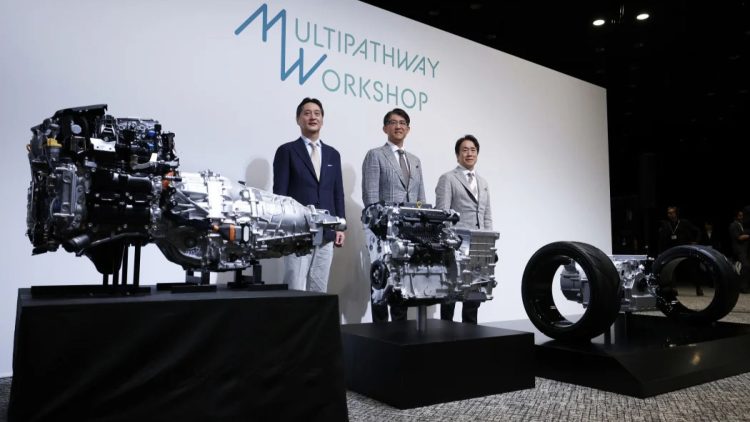They’re not exactly leading the way when it comes to Electric Vehicle technology. In fact, these car manufacturers have to date been very mum on the whole matter. But now, they are joining forcing to blaze a trail once more when it comes to developing new internal-combustion engines. Toyota, Mazda, and Subaru are teaming up to pool their knowledge and resources to develop state-of-the-art engines that incorporate powertrains or are compatible with alternative, carbon-neutral fuels like biofuels, liquid hydrogen, and other synthetic fuels. The three companies came together recently at the Multipathway Workshop, where they set goals to improve engine efficiency and performance, make engines compatible with alternative fuels and reduce CO2 emissions. Having settled on this, each brand then went on to confirm that they would each be focusing on their ‘own signature engine’.
Toyota goes for more compact engines and improved aerodynamics
Toyota is set on developing two four-cylinder engines (a 1.5L and a 2.0L). This will replace existing models of the same. Toyota says that these engines will be designed to be more compact, allowing for improved vehicle packaging and aerodynamics – which is just so necessary with EVs. It revealed that the 1.5-liter engine will approximately be 10% shorter than its predecessors and offer 12% better fuel economy compared to the current 1.5-liter three-cylinder engine.
“The 2.0-liter turbocharged engine is about 30% shorter and 30% less voluminous than the existing 2.5-liter naturally aspirated four-cylinder engine, maintaining similar power output but with reduced thermal efficiency,” the company said. Mazda will be working rotary EV systems with one or two rotors. This is actually a technology that the company is well-known for. Mazda new rotary systems will obviously now be designed to work with EVs.
Mazda hones in on extra driving range capacity
The company said plans to develop either single or dual-rotor rotary engines, which are compact and efficient. These rotary engines will probably serve as range extenders for EVs, helping out with extra driving range when the electric battery runs low. Rotary engines are known for their unique design, which offers smooth power delivery and compact size. Of course this makes them ideal for integration with EV systems.
Subaru drives emission reduction
Subaru will be working on a new hybrid version of its boxer engine. The boxer engine’s flat design helps with better handling and stability. By adding hybrid technology, Subaru hopes to improve fuel efficiency and reduce emissions. This new engine was first shown in a Crosstrek prototype.
It’s all about that competitive edge
By coming together like this, with each company focusing on its strength, the car manufacturers are hoping that the collaboration will help them stay competitive and keep improving their vehicles. The collaboration also gives them the freedom to explore cleaner fuel options.
Toyota still a hybrid tech pro
Toyota’s hybrid technology has seen some real growth in recent years. According to the company, in 2024, Toyota sold over 1 million electrified vehicles in the United States marking a 53% increase from the previous year. These vehicles accounted for 44.5% of Toyota’s total sales.
The Toyota RAV4 Hybrid has been a model that has done particularly well, with 152,328 units sold of September 2024. The Camry Hybrid was also quite popular as a hybrid vehicle option with approximately 122,000 units sold during the same period.
Koji Sato, President, Member of the Board of Directors and CEO, Toyota Motor Corporation, said: “In order to provide our customers with diverse options to achieve carbon neutrality, it is necessary to take on the challenge of evolving engines that are in tune with the energy environment of the future. The three companies, which share the same aspirations, will refine engine technologies through friendly competition.”

